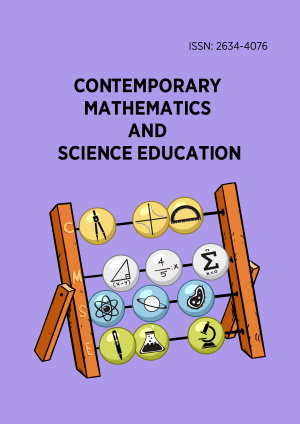Research Article
Roles of Classroom Management and Mastery-Oriented Instructions on Relationship Between Pedagogical Content Knowledge and Mathematics Achievement
More Detail
1 Department of Mathematics Education, Akenten Appiah-Menka University of Skills Training and Entrepreneurial Development, Kumasi, GHANA* Corresponding Author
Contemporary Mathematics and Science Education, 3(2), July 2022, ep22016, https://doi.org/10.30935/conmaths/12340
Submitted: 29 May 2022, Published: 11 August 2022
OPEN ACCESS 1949 Views 1117 Downloads
ABSTRACT
Despite multiple studies in the past, seeking to assess the determinants of students’ achievement in mathematics, less attention has been paid to the simultaneous role of classroom management (CM), mastery-oriented instructions, and teacher pedagogical content knowledge (PCK). This study, therefore, looked at the mediation effects of mastery-oriented instructions and CM in the relationship between teacher PCK and students’ mathematics achievement. The study was a survey and quantitative. A simple random sampling approach was used to select 401 senior high school students from five schools in the Kumasi Metropolis. A structural equation model was used in analyzing the effect of the relationship between the variables. It was concluded that teacher PCK had a significant relationship with students’ mathematics achievement. It also had a significant effect on mastery-oriented instructions and CM. It was revealed that both teacher PCK and CM did not mediate the relationship between teachers’ PCK and students’ mathematics achievement.
CITATION (APA)
Owusu, R., Awuni, D. A., Arthur, Y. D., & Gordon, J. F. (2022). Roles of Classroom Management and Mastery-Oriented Instructions on Relationship Between Pedagogical Content Knowledge and Mathematics Achievement. Contemporary Mathematics and Science Education, 3(2), ep22016. https://doi.org/10.30935/conmaths/12340
REFERENCES
- Akin, S., Yildirim, A., & Goodwin, A. L. (2016). Classroom management through the eyes of elementary teachers in Turkey: A phenomenological study. Educational Sciences: Theory & Practice, 16(3), 771-797. https://doi.org/10.12738/estp.2016.3.0376
- Block, J. H., & Burns, R. B. (1976). Mastery learning. Review of Research in Education, 4, 3-49. https://doi.org/10.2307/1167112
- Carnoy, M., & Arends, F. (2012). Explaining mathematics achievement gains in Botswana and South Africa. Prospects Quarterly Review of Comparative Education, 42(4), 453-468. https://doi.org/10.1007/s11125-012-9246-6
- Cohen, E. G., & Lotan, R. A. (2014). Designing groupwork: Strategies for the heterogeneous classroom. Teachers College Press.
- Cueto, S., León, J., Sorto, M. A., & Miranda, A. (2017). Teachers’ pedagogical content knowledge and mathematics achievement of students in Peru. Educational Studies in Mathematics, 94(3), 329-345. https://doi.org/10.1007/s10649-016-9735-2
- Doyle, W. (1986). Classroom management techniques and student discipline. https://files.eric.ed.gov/fulltext/ED315883.pdf
- Elliott, A., & Dweck, C. (2007). Handbook of competence and motivation. The Guilford Press.
- Freiberg, H. J. (1983). Consistency: The key to classroom management. British Journal of Teacher Education, 9(1), 1-15. https://doi.org/10.1080/0260747830090101
- Grant, H., & Dweck, C. S. (2003). clarifying achievement goals and their impact. Journal of Personality and Social Psychology, 85(3), 541. https://doi.org/10.1037/0022-3514.85.3.541
- Gudmundsdottir, S., & Shulman, L. (1987). Pedagogical content knowledge in social studies. Scandinavian Journal of Educational Research, 31(2), 59-70. https://doi.org/10.1080/0031383870310201
- Guskey, T. R. (2005). Formative classroom assessment and Benjamin S. Bloom: Theory, research, and implications [Paper presentation]. The Annual Meeting of the American Educational Research Association.
- Hill, H. C., Ball, D. L., & Schilling, S. G. (2008). Unpacking pedagogical content knowledge: Conceptualizing and measuring teachers’ topic-specific knowledge of students. Journal for Research in Mathematics Education, 39(4), 372-400. https://doi.org/10.5951/jresematheduc.39.4.0372
- Hill, H. C., Rowan, B., & Ball, D. L. (2005). Effects of teachers’ mathematical knowledge for teaching on student achievement. American Educational Research Journal, 42(2), 371-406. https://doi.org/10.3102/00028312042002371
- Jacob, F., John, S., & Gwany, D. M. (2020). Teachers’pedagogical content knowledge and students’ academic achievement: A theoretical overview. Journal of Global Research in Education and Social Science, 14(2), 17-44.
- Kane, T. J., Rockoff, J. E., & Staiger, D. O. (2008). What does certification tell us about teacher effectiveness? Evidence from New York City. Economics of Education Review, 27(6), 615-631. https://doi.org/10.1016/j.econedurev.2007.05.005
- Kraft, M. A. (2010). From ringmaster to conductor: 10 simple techniques can turn an unruly class into a productive one. Phi Delta Kappan, 91(7), 44-47. https://doi.org/10.1177/003172171009100709
- Martin, N. K., & Sass, D. A. (2010). Construct validation of the behavior and instructional management scale. Teaching and Teacher Education, 26(5), 1124-1135. https://doi.org/10.1016/j.tate.2009.12.001
- Marzano, R. J., Marzano, J. S., & Pickering, D. (2003). Classroom management that works: Research-based strategies for every teacher. ASCD.
- Nunnally, J. C. (1978). Psychometric theory. McGraw-Hill.
- Odumosu, O., & Fisayi, A. (2018). Teachers’ content and pedagogical knowledge on students’ achievement in algebra. International Journal of Education and Research, 6(3), 83-94.
- Rogers, C., & Freiberg, H. (1994). Freedom to learn. Merrill.
- Saifi, I. L., Hussain, M., Salamat, L., & Bakht, M. I. (2018). Impact of classroom management on students’ achievement at the university level. Asian Innovative Journal of Social Sciences & Humanities, 2(2), 13-27.
- Sekreter, G. (2018). The classroom management strategies for the efficiency of mathematics teaching-learning process: Everything you need. International Journal of Social Sciences & Educational Studies, 5(1), 85-95. https://doi.org/10.23918/ijsses.v5i1p85
- Strong, M., Gargani, J., & Hacifazlioglu, O. (2011). Do we know a successful teacher when we see one? Experiments in the identification of effective teachers. Journal of Teacher Education, 62(4), 367-382. https://doi.org/10.1177/0022487110390221
- Valentini, F., & Damasio, B. F. (2016). Average variance extracted and composite reliability: Reliability coefficients. Psicologia: Teoria e Pesquisa [Psychology: Theory and Research], 32(2). https://doi.org/10.1590/0102-3772e322225
- Wang, M. C., Haertel, G. D., & Walberg, H. J. (1993). Toward a knowledge base for school learning. Review of Educational Research, 63(3), 249-294. https://doi.org/10.3102/00346543063003249
- Wolfgang, C. H., & Glickman, C. D. (1980). Solving discipline problems: Strategies for classroom teachers. Allyn and Bacon, Inc.
- Zaw, Y. Z., & Lwin, K. K. (2020). The effect of mastery learning strategy on students’ mathematics achievement at the middle school level. Journal of the Myanmar Academy of Arts and Science, 303-319.
- Zhou, W., & Li, G. (2015). Chinese language teachers’ expectations and perceptions of American students’ behavior: Exploring the nexus of cultural differences and classroom management. The System, 49, 17-27. https://doi.org/10.1016/j.system.2014.10.011

 The articles published in this journal are licensed under the CC-BY Creative Commons Attribution International License.
The articles published in this journal are licensed under the CC-BY Creative Commons Attribution International License.